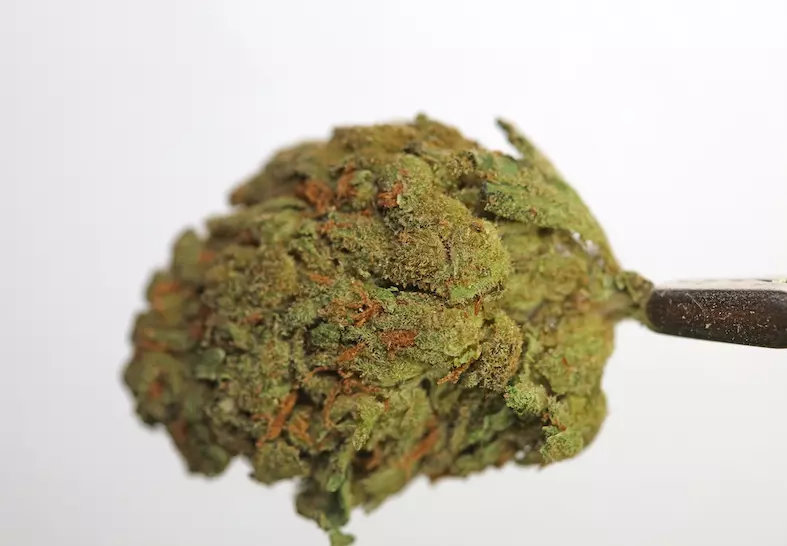Lemon Skunk traces its roots to Las Vegas, when two cuts of Skunk #1 out of California were selected for their fragrant lemon characteristics, and crossed. The Lemon Skunk strain, sometimes referred to as Lemon Skunk OG, was bred by DNA Genetics’ Lemon Man, an individual who has dedicated himself to perfecting and maintaining these genetics.
Lemon Skunk Strain Info
In the late 1990s, a teenaged Lemon Man brought his prized cut of Lemon Skunk to Holland, where the genetics spread like wildfire. As cannabis expert and Amsterdammer “The Nose” explains, “Amsterdam is an impatient place when it comes to genetics. People get hold of something nice; they start messing with it, seeing what they can come up with. It becomes very convoluted, because cuttings and seeds get distributed widely. They’re manipulated, then passed on, and people lose track of where the strains come from.”
Most would agree that this wide distribution of and subsequent experimentation on different varieties of cannabis only serves to benefit the consumer, especially as new, favorable strains come as a result. In this case, we’re looking at Dutch seed company and coffee shop Green House, and their popular Super Lemon Haze. Though there’s been some conjecture in recent years, Green House CEO Arjan Roskam has described Super Lemon Haze, a Green House original, as being a cross between Lemon Man’s Lemon Skunk and Super Silver Haze.
Lemon Skunk has been a game changer, both on its own as a unique strain, and as a parent to numerous cultivars we know and love today. In 2007, Lemon Man’s Lemon Skunk mother, crossed with a Skunk #1 courtesy of the Flying Dutchman, took first place for DNA Genetics at the High Life Cup. A year later, Lemon Man’s cut was declared the first place hydro winner at the 2008 Spannabis Championship Cup.
Vintage: mid-1990s
Lineage: Skunk #1 x Skunk #1
Breeder: DNA Genetics
Pheno Hunter: Lemon Man
Lemon Skunk Strain Effects: Indica or Sativa?
Lemon Skunk is a well-balanced sativa-dominant strain, with effects described as thought provoking and exhilarating. The strain encourages focus and heightened creativity, and in many cases, acts as a strong aphrodisiac. As one fan describes it, “Lemon Skunk is a cheerful, moderately potent, daytime strain. It is mildly cerebral and most therapeutic if used before an activity, game, or chore, as it is stimulating.”

Like other Skunk #1 variants such as Cheese, Lemon Skunk comes on strong with an uplifting, focused buzz that transcends into a relaxing, heavy-bodied high. In addition to the focused and relaxing aspects of Lemon Skunk, it is also a powerful pain reliever. The strain is often prescribed to medical patients who suffer from migraines. Lemon Skunk is well balanced in that while it acts as a powerful analgesic, it is still a viable option for daytime use.
Pain relief and mental stimulation aren’t the only benefits this strain has to offer. Lemon Skunk is an incredibly effective appetite stimulant and is often sought out by patients to combat nausea. Many find comfort in the strain’s burst of clear-headed euphoria, and turn to the strain to relieve symptoms of depression or anxiety, while others describe the onset as intense, citing confusion and racing thoughts. As with most strains, these less favorable effects are typically found with higher levels of consumption by those with lower tolerance. Knowing your personal limits and taking a second to learn about the strain you’re about to consume is always the most effective defense against an uncomfortable time.
Lemon Skunk Strain Characteristics and Terpenes
Lemon Skunk was bred by selecting two particularly zesty lemon-scented phenotypes of Skunk #1. Lemon Skunk still possesses an often faint hint of Skunk #1’s musky, earthy odor, but with its own unique blast of citrus that essentially dominates all other fragrances. The namesake lemon scent is incredibly powerful, to the extent that it could easily be confused with that of a regular lemon tree. The real sweetness of the lemon scent is typically highlighted once the flower is smoked. Despite its immediate relation to a strain that was originally (and aptly) referred to as “Roadkill Skunk”, Lemon Skunk offers one of the most clean, pleasant flavor profiles out there.
The small to medium-sized conical nugs are typically a vibrant, light green color, but the most significant part of their appearance is the forest of burning orange hairs that cover them. It makes sense that a strain with such an attention-grabbing scent also has an eye-catching appearance.
The main terpene found in Lemon Skunk is caryophyllene, a compound known for its spicy fragrance and anti-inflammatory properties. Other terpenes commonly found in Lemon Skunk include myrcene, an earthy, herbal terpene, and limonene, which is associated with a variety of tropical and citrus aromas.
Lemon Skunk Grow Info
Lemon Skunk is a medium-yielding strain with a flowering time of approximately 56 days. It has been said that this is a strain best suited to smaller scale or personal growing operations, as it offers more modest yields, but is potent and not all that difficult to cultivate. Some of this ease in growth comes from the plant’s resistance to mold, mildew, and more in the grow room.
DC Cultivator AltSol uses DNA Lemon Skunk and has this to say: “Lemon Skunk grows short with light green leaves, thick orange hairs, and dense, compact flowers. To get the fullness of Lemon Skunk’s sweet citrus flavor and aroma, the seed bank recommends harvesting after 50-56 days of flowering.”
As of writing, the best place to find Lemon Skunk seeds in the United States might be Seed Supreme, as DNA Genetics doesn’t ship to the US and Seedsman is currently out of stock. You can also find more Lemon Skunk options from Seed Supreme, including the Green House Seeds version and an autoflowering version from Seedsman.
